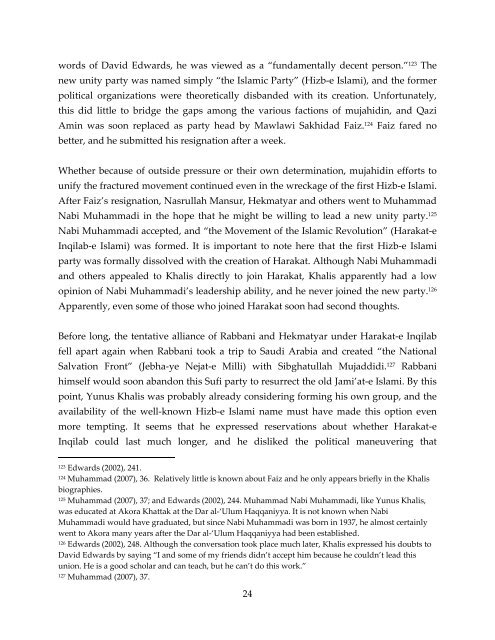Usama bin Ladin’s “Father Sheikh”:
Usama bin Ladin’s “Father Sheikh”:
Usama bin Ladin’s “Father Sheikh”:
Create successful ePaper yourself
Turn your PDF publications into a flip-book with our unique Google optimized e-Paper software.
words of David Edwards, he was viewed as a “fundamentally decent person.” 123 The<br />
new unity party was named simply “the Islamic Party” (Hizb‐e Islami), and the former<br />
political organizations were theoretically disbanded with its creation. Unfortunately,<br />
this did little to bridge the gaps among the various factions of mujahidin, and Qazi<br />
Amin was soon replaced as party head by Mawlawi Sakhidad Faiz. 124 Faiz fared no<br />
better, and he submitted his resignation after a week.<br />
Whether because of outside pressure or their own determination, mujahidin efforts to<br />
unify the fractured movement continued even in the wreckage of the first Hizb‐e Islami.<br />
After Faiz’s resignation, Nasrullah Mansur, Hekmatyar and others went to Muhammad<br />
Nabi Muhammadi in the hope that he might be willing to lead a new unity party. 125<br />
Nabi Muhammadi accepted, and “the Movement of the Islamic Revolution” (Harakat‐e<br />
Inqilab‐e Islami) was formed. It is important to note here that the first Hizb‐e Islami<br />
party was formally dissolved with the creation of Harakat. Although Nabi Muhammadi<br />
and others appealed to Khalis directly to join Harakat, Khalis apparently had a low<br />
opinion of Nabi Muhammadi’s leadership ability, and he never joined the new party. 126<br />
Apparently, even some of those who joined Harakat soon had second thoughts.<br />
Before long, the tentative alliance of Rabbani and Hekmatyar under Harakat‐e Inqilab<br />
fell apart again when Rabbani took a trip to Saudi Arabia and created “the National<br />
Salvation Front” (Jebha‐ye Nejat‐e Milli) with Sibghatullah Mujaddidi. 127 Rabbani<br />
himself would soon abandon this Sufi party to resurrect the old Jami’at‐e Islami. By this<br />
point, Yunus Khalis was probably already considering forming his own group, and the<br />
availability of the well‐known Hizb‐e Islami name must have made this option even<br />
more tempting. It seems that he expressed reservations about whether Harakat‐e<br />
Inqilab could last much longer, and he disliked the political maneuvering that<br />
123 Edwards (2002), 241.<br />
124 Muhammad (2007), 36. Relatively little is known about Faiz and he only appears briefly in the Khalis<br />
biographies.<br />
125 Muhammad (2007), 37; and Edwards (2002), 244. Muhammad Nabi Muhammadi, like Yunus Khalis,<br />
was educated at Akora Khattak at the Dar al‐‘Ulum Haqqaniyya. It is not known when Nabi<br />
Muhammadi would have graduated, but since Nabi Muhammadi was born in 1937, he almost certainly<br />
went to Akora many years after the Dar al‐‘Ulum Haqqaniyya had been established.<br />
126 Edwards (2002), 248. Although the conversation took place much later, Khalis expressed his doubts to<br />
David Edwards by saying “I and some of my friends didn’t accept him because he couldn’t lead this<br />
union. He is a good scholar and can teach, but he can’t do this work.”<br />
127 Muhammad (2007), 37.<br />
24


